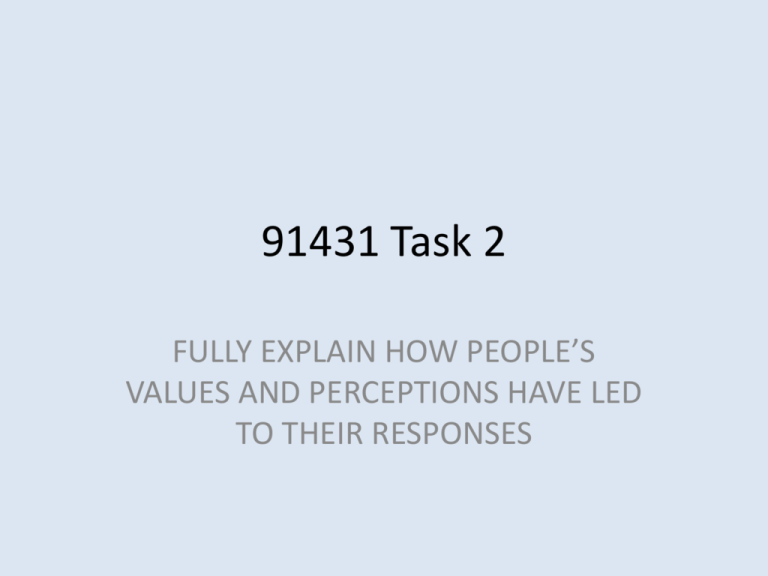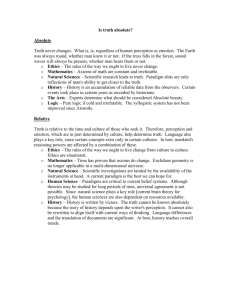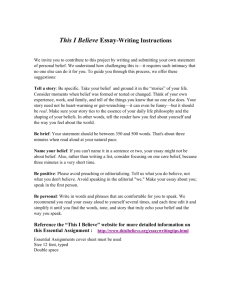File
advertisement

91431 Task 2 FULLY EXPLAIN HOW PEOPLE’S VALUES AND PERCEPTIONS HAVE LED TO THEIR RESPONSES What are values • Deeply held beliefs about what is important or desirable that determines what is important to the individual. • Types: Moral, social, cultural, aesthetic, economic, environmental values • Understanding people’s values can help explain why someone holds a certain point of view. Values “ I support e waste recycling” Why? ……..environment needs protecting to safeguard the future of the planet ………guardianship of a resource for future generations. Perspectives? Environmental or Kaitiakitanga Points of view • • • • • Viewpoints Opinion Position Preference Or a stance taken in regard to an issue or proposal • E.g. “I am all for the City Council introducing ewaste recycling as I am worried about the state of our local landfill. What are perspectives Ways of seeing the world that help explain differences in decisions about, responses to and interactions with the environments. Bodies of thought theories or world views that shape people’s values and have been built over time. a perspective is a framework that can be used to interpret the meanings of experiences, events, places, persons, cultures, and physical environments. Having a perspective means looking at our world through a lens shaped by personal experience, selective information, and subjective evaluation. A perspective provides a frame of reference for asking and answering questions, identifying and solving problems, and evaluating the consequences of alternative actions. What are perceptions The way the individuals view and interpret their environment. “NIMBYS” Not in my back yard “WIIFM” What's in it for me? What is an Issue • A proposed course(s) of action that cause opposing points of view. Draw up a Table to show a summary of the Viewpoints of people to the Issue of the new routes to the Milford Sound Person or group Colleen Morgan Lisa Sadler Geoff Thomson Ron Egan David Hawkey Kevin Hackwell Bob Robertson Tom Elworthy Role/Occupa Response to tion the issue Values Perception Perspective The perspective Economic Definition Analysing an issue from an economics basis. How the issue impacts economic growth. Is it increased, diminished or remaining constant? Sustainability Kaitiakitanga To “care for” the environment; sustainable use, management and control of natural and physical resources that are carried out to the mutual benefit of people and resources (note – this is a concept) Scientific A belief in science. That all true knowledge is scientific and can be measured. The belief that measurable results are important, that personal, subjective viewpoints have less weight. Post Modern A scepticism towards the ideas of progress. (have reservations towards progress) A belief in decentralisation. (‘large scale’ is controlling and removed from the ordinary person). This can also leads to a questioning of mass media. Bi-cultural Typically adopted in nations that have emerged from a history of ethnic conflict. Policies influence the structures and decisions of governments to ensure that political and economic power and influence are allocated equitably between those people who identify with the opposite sides of the cultural divide. Environmental The idea that the environment needs support and that human activity must be guided to avoid what is believed to be, destruction of the environment. The perspective Economic Definition Typically adopted in nations that have emerged from a history of ethnic conflict. Policies influence the structures and decisions of governments to ensure that political and economic power and influence are allocated equitably between those people who identify with the opposite sides of the cultural divide. Sustainability Kaitiakitanga Analysing an issue from an economics basis. How the issue impacts economic growth. Is it increased, diminished or remaining constant? Scientific A skepticism towards the ideas of progress. (have reservations towards progress) A belief in decentralisation. (‘large scale’ is controlling and removed from the ordinary person). This can also leads to a questioning of mass media. Post Modern The idea that the environment needs support and that human activity must be guided to avoid what is believed to be, destruction of the environment. Bi-cultural To “care for” the environment; sustainable use, management and control of natural and physical resources that are carried out to the mutual benefit of people and resources (note – this is a concept) Environmental A belief in science. That all true knowledge is scientific and can be measured. The belief that measurable results are important, that personal, subjective viewpoints have less weight. Every perception a person has is based upon their own personal experience. People perceive the world differently because no two people have the same experiences. Experience makes us who we are. It shapes our minds and opinions, our likes and dislikes. Therefore, it is difficult to have one ideal definition of certain concepts, such as justice, virtue, and an ideal society. Our experiences color our opinions of people different than ourselves and even our opinion of the dark. The only way to create one perception of reality would be to systematically force everyone to have the same experiences. Fortunately, by using the kind of perception checking skills explored earlier, we can do our best to understand how others are experiencing the world and we can avoid misinterpreting their behavior. Capitalist perspective • Refers to an economic and social system • Production or capital should be controlled by the individual • Property should be privately owned • Money is tool of exchange • Competition is encouraged Pre- Modernist • Traditional society • Modern is evil Post Modernist • Tolerance • No ideology is sacred • Individuals are free to choose Individualism • All about thinking about oneself over the needs of many Humanitarianism • People should use their personal resources money, skills, knowledge time to help others who are less fortunate. • Respect and dignity





